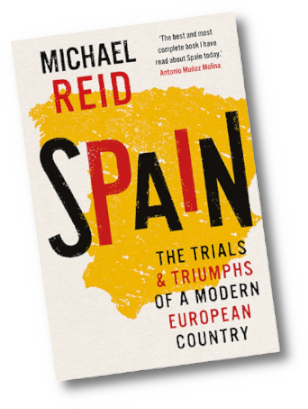Uruguay’s long-term commitment to growth
- Finton Hanks
On 10 February, the Minister of Economy of Uruguay, Gabriel Oddone, joined Canning House to discuss the continued growth of the Uruguayan economy.
Briefing
Learn More News
Writer and journalist Michael Reid, former Madrid correspondent for the Economist and author of Spain: The Trials and Triumphs of a Modern European Country, spoke at a roundtable hosted by Canning House on Wednesday 26 July.
Writer and journalist Michael Reid, former Madrid correspondent for the Economist and author of Spain: The Trials and Triumphs of a Modern European Country, spoke at a roundtable hosted by Canning House on Wednesday 26 July.
Held just days after Spain’s 23 July snap election, which was called by Prime Minister Pedro Sánchez following losses in May’s local elections for his party; and the 17-18 July European Union (EU) – Community of Latin American and Caribbean States (CELAC), spearheaded by Spain in its presidency of the Council of the European Union, the roundtable offered a timely forum for discussion on Spanish politics.
Following a brief introduction by Jeremy Browne, CEO of Canning House, Michael delivered a wide-ranging talk on the results and implications of Sunday’s vote. He explained that while both major parties – the Partido Socialista Obrero Español (Socialists/PSOE) and Partido Popular (PP) – made electoral gains, with neither attaining the threshold of 176 congressional seats (of 350 total) the country is left with a hung parliament, and an especially challenging coalitional arithmetic.
Neither Sumar nor Vox – parties further to the extremes of the left and right, respectively – can alone offer PSOE or PP the sufficient seats to reach that threshold, either. That means PSOE or PP would also need to bring nationalist parties, like the Catalan Junts and Esquerra or Basque Bildu, into coalition – likely with accompanying demands for amnesties and referenda.
Spain therefore now enters likely weeks of inter-party negotiations while, in Michael’s words, “the trench dividing the left and right remains wider than any country in Western Europe.” He reasoned that a repeat election in November or December was the likeliest outcome, with an expectation that both main parties will benefit due to tactical voting.
For more analysis from Michael on Spain’s election, read his new blog post here.
Beyond the specifics of Spain’s electoral politics in this vote, Michael also discussed other challenges facing the country in recent years, likely set to persist: climate change, low productivity, red tape, improving public education, a need for renewal of the country’s institutions, and still-surviving political polarisation.
Questions for Michael touched on topics including the significance of Catalonia in this election; what has to change ahead of a repeat election for the main parties to energise their base and find success; media expectation of PP victory; the importance of voter disillusionment, and more.
Gabriel Cohen, who wrote for the Canning House blog following the EU-CELAC summit last week, also spoke briefly on the outcomes from the conference in Brussels, including the mixed enthusiasm for the stalled EU-Mercosur deal, the dominance of Ukraine in conversation, and engagement with China.
The roundtable was followed by a drinks reception, featuring Spanish tapas. Canning House thanks the event's contributors and audience for their engagement.

Michael’s new book, Spain: The Trials and Triumphs of a Modern European Country, is available on the Yale University Press website. Use code Y2352 on the Yale University Press website for a special discount offer!
(Offer available for customers in the UK, subject to availability. Offer ends 31/08/23.)
By joining Canning House, you will become part of the UK's leading forum for informed comment, contacts and debate on Latin American politics, economics and business.
Just £50 per year.
All of Canning House's activities, including our upcoming events, insightful publications, latest news, and featured events from the UK-Latin America community.
In your inbox, every week, for free.